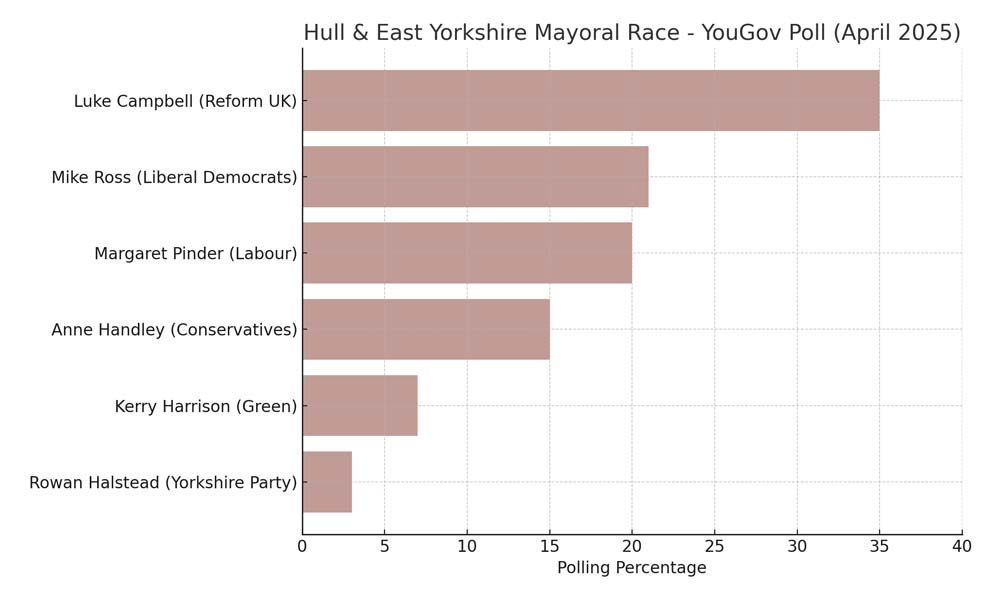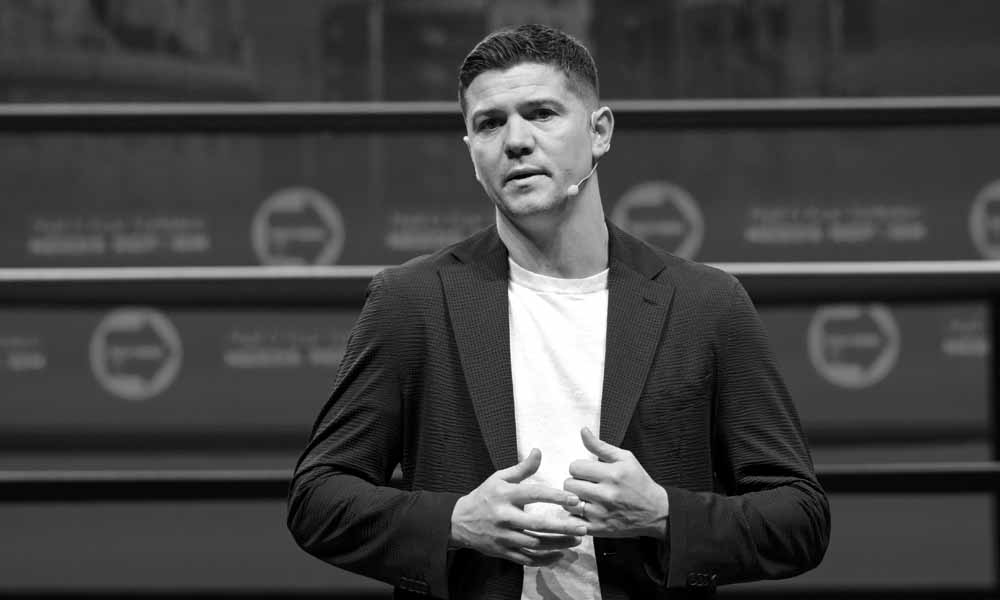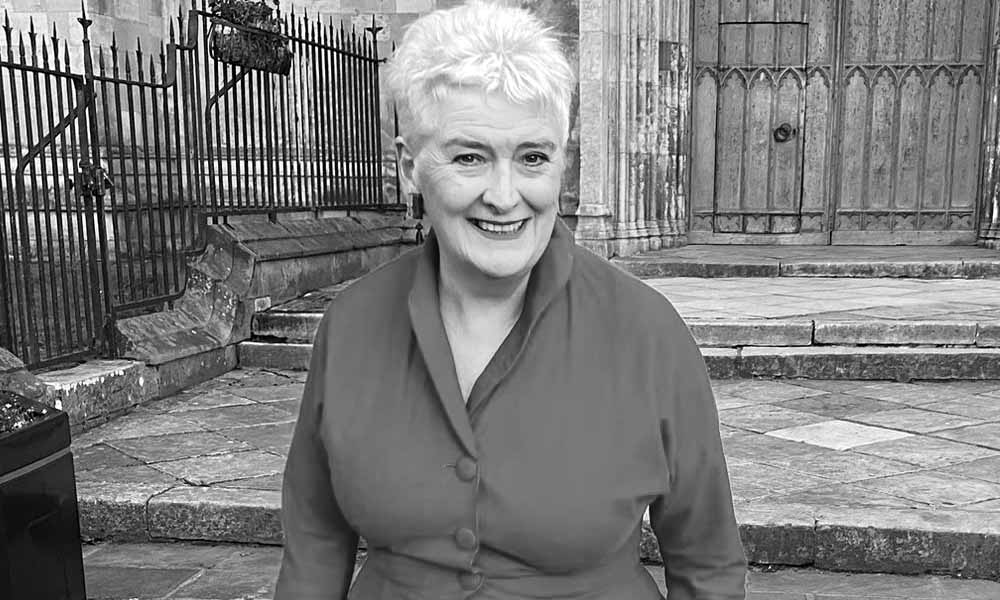Luke Campbell, the Olympic boxing champion turned Reform UK candidate, has emerged as the frontrunner in the race to become the first Mayor of Hull and East Yorkshire, according to a new YouGov poll.
The poll places Campbell on 35% votes, a substantial lead over his nearest rivals, Liberal Democrat Mike Ross (21%) and Labour’s Margaret Pinder (20%). Conservative candidate Anne Handley is on 15%, with the Greens and the Yorkshire Party polling at 7% and 3% respectively.

The result, if reflected at the ballot box, would represent a significant political upset. Hull and East Yorkshire, traditionally battlegrounds between Labour and the Conservatives, appear increasingly receptive to Reform UK’s message of change. Campbell’s personal popularity, bolstered by his local roots and sporting pedigree, has also played a critical role in setting the pace of the race.
Yet despite Campbell’s commanding position, party strategists are warning that the election is far from decided. With almost a week of campaigning remaining, and polling day scheduled for May 1, much could still shift.
Polls, particularly in newly created mayoral contests, are notoriously volatile. Low turnout, late swings, and tactical voting could all distort the final outcome. Each party is now intensifying efforts to mobilise its base, issuing urgent appeals to supporters to turn out on the day. Not to mention grass roots recognition for names like Cllr Anne Handley who through multiple local projects like the Two Rivers Food bank has a quite but significant following in local communities.
In what is expected to be a tight, low-turnout election, securing voter enthusiasm could prove just as decisive as winning the air war of messaging.
Campbell’s rivals, meanwhile, will be hoping that the final days of campaigning expose vulnerabilities in Reform UK’s insurgent campaign — and that a late rally among traditional party voters could yet alter the shape of this historic first mayoral contest.
The Candidates at a Glance

Luke Campbell (Reform UK)
A local sporting hero, Campbell won gold for Britain in boxing at the London 2012 Olympics before moving into professional boxing. His campaign for mayor has leaned heavily on his personal story and outsider credentials, presenting himself as a fresh alternative to the established parties. Reform UK’s growing national profile has further fuelled his rise.

Mike Ross (Liberal Democrats)
Leader of Hull City Council, Ross has sought to leverage his record in local government, pitching himself as an experienced, pragmatic choice. His campaign has focused on community investment, green transport, and housing, with hopes of consolidating centrist and anti-Reform voters.

Margaret Pinder (Labour)
A former barrister and seasoned political campaigner, Pinder has represented Labour’s traditional strength in the region. However, she faces the challenging task of motivating Labour’s core vote in an election where disillusionment and political fragmentation could undermine the party’s historic advantage.

Anne Handley (Conservatives)
Currently leader of the East Riding of Yorkshire Council, Handley entered the mayoral race with a platform centred on economic growth, transport improvements, and regional pride. But national Conservative struggles in the polls have complicated her path to wider appeal across Hull and East Yorkshire.

Kerry Harrison (Green Party)
The Green candidate has concentrated on issues such as climate resilience, sustainable housing, and clean transport, aiming to build on the party’s modest but persistent local support. While unlikely to win, Harrison’s second-preference votes could prove influential if the contest tightens.

Rowan Halstead (Yorkshire Party)
Running on a platform of stronger devolution and regional autonomy, Halstead appeals to voters disillusioned with Westminster politics. While his polling remains low, his candidacy taps into a broader sentiment for greater local control in Yorkshire.
Analysis: A Region Ready for Change?
Luke Campbell’s commanding poll lead reflects a political mood across Hull and East Yorkshire that national parties have struggled to grasp. Reform UK, offering a message of anti-establishment renewal, has managed to capture a protest vote without the toxic baggage that hampered similar movements in the past.
Campbell’s appeal is as much personal as political. His local roots and reputation as a determined fighter — both inside and outside the boxing ring — have given him credibility in a region where voters increasingly feel overlooked by Westminster.
Labour, once dominant across Hull, faces familiar challenges: a lack of enthusiasm among its traditional base, internal divisions, and the perception that it has failed to offer a convincing vision of change. Margaret Pinder’s credentials are strong, but in a contest shaped by voter disillusionment, experience has so far proven a weak currency.
The Conservatives, still struggling nationally, are finding the East Riding’s traditional loyalties harder to convert into mayoral enthusiasm. The well-respected Anne Handley’s challenge is less about her well- honed leadership style and stellar grasp on policy and more about surviving the national picture. She may however, like the fourth place runner in an unpredictable grand national, make a final surge along the track mobilising the support she possess at grass roots level to claim the win.
If Campbell maintains momentum through the final week, his victory could signal not just a local upset, but a warning to the major parties that the political realignment of Britain’s towns and regions is far from complete.
The outcome, however, will ultimately hinge on whether voters who express dissatisfaction in polls are willing to turn up at the ballot box — and how effectively the traditional parties can mobilise their remaining loyalists.
The vote will be held on 1st May.


